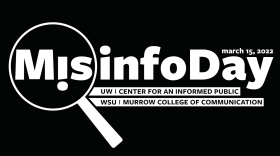-
A retired Clarkston ophthalmologist was facing discipline from the Washington Medical Commission after writing a series of opinion columns sharing contested COVID-19 information. Now, he will be allowed to appeal a decision denying his request for a preliminary injunction. Rachel Sun reports.
-
When the COVID-19 pandemic reached the Inland Northwest almost three years ago, Dr. Max Williams started seeing a change in some of his patients that shocked him: People he had treated successfully for years no longer trusted him.
-
The Benton County Auditor is testing a new paid ballot observer program this year using members of partisan and nonpartisan organizations.
-
(Runtime 2:35)State Representative Brad Klippert has been using his Congressional Campaign social media account to encourage people to monitor drop-boxes…
-
Tuesday, March 15 is Misinfo Day, an annual event sponsored by the University of Washington Center For An Informed Public and WSU's Murrow College of…
-
Ahead of the first Fourth of July since an attack on the Capitol, fueled by baseless claims of voter fraud, and as several GOP-led states work now to enact stricter voting rules, majorities of Democrats, Republicans and independents express worry about the health of democracy.
-
Seniors are especially at risk. People over 65 were more likely to share false or misleading content on Facebook during the 2016 presidential campaign, according to one study from researchers at Princeton and New York University. Older adults were also exposed to more misinformation on Twitter during that election.
-
Robert F. Kennedy Jr. is now blocked from Instagram after he repeatedly undercut trust in vaccines. Kennedy has also spread conspiracy theories about Bill Gates, accusing him of profiteering off vaccines and attempting to take control of the world's food supply.
-
State and local election officials in Washington sought to reassure voters Monday that robust security measures are in place to protect against interference with the general election, even as they acknowledged the likelihood that bad actors will try to sow distrust and undermine confidence in the national election results.
-
Twitter will label or remove posts that spread misinformation. Social media companies are under pressure to curb the spread of false claims and prevent interference from foreign and domestic actors.
Play Live Radio
Next Up:
0:00
0:00
Available On Air Stations










